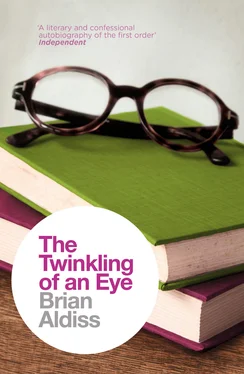That’s what little boys are made of
Her weeping, hand shading eyes so that face could not be seen, is a convincing performance. Only when Betty comes along is there someone robustly to reject this pantomime, this hypocrisy.
Worse still, Dot has a way of governing me. She has a threat far worse than Bill’s thrashings. When I misbehave, she delivers the threat.
‘I shan’t love you any more if you do that.’
This poison, too, she must have felt, lacked some precision. She developed a variant which I found more lethal.
‘If you do that again, I shall run away and leave you.’
I have lapsed into a past tense. The film of childhood is breaking down. Time is on its destructive course.
When these threats are issued, I am made ill. I am a robust and jolly little boy, rarely sick. However, I have what Dot calls ‘bilious attacks’. Dr Duygan is summoned, with his old black bag. He can find nothing physically wrong. The attacks are a mystery, to me as much as anyone else.
The attacks earn me a groat of gratitude: I am always sick into the lavatory bowl. Not a drop is spilt elsewhere. It shows commendable control.
Decades later, as a grown man, I face a similar crisis, and yield up a similar response. So I perceive the true nature of those puzzling childish attacks. They are a nervous response to Dot’s threats; attempts to spew out the poisons she pours into my mind. They are not ‘bilious attacks’. They are violent physical responses to emotional attacks.
My agony of mind is great. I resolve that if things become too bad, I will go down to the shop and tell Bill. He will make Dot stop. He will understand I cannot help being bad. But I never put it to the test.
I take to running from the house. I hide in the shop. I climb trees. I trot about Dereham streets. After dark one evening, I am run over by a bike. The man dismounts and calls anxiously. But I rush limping away, hiding in an alley until I’m better. I go home with dirty clothes. Dot is plaintive when she sees the mud.
This time she really will leave me if I continue to be naughty.
She adds details. She will run away up Norwich Street and never come back.
I go into the lavatory and throw up. Yet another ‘bilious attack’.
It is convenient that I now go to school. It gives Dot more time alone. Bill works downstairs in the shop, coughing his dry cough.
Dot takes it easy upstairs. She is pregnant.
I have no knowledge of this aspect of the universe, which later will interest me greatly. I do not realise that Dot is growing larger. I can summon no recollection of her sorrows and sufferings during those months.
What remains in mind is that I am induced to kneel by her side and pray with her every evening.
Dear God, you know how I suffer. This time, this time , please let it be a girl.
I kneel by her side, hands clasped together, eyes tight closed, less than the dust. I know I am her mistake.
1931 dawns. I am still taking the Rainbow and following the exploits of Mrs Bruin’s Boys, but my mental horizons are widening. Dot likes to be driven by one of the staff to Norwich. She takes me with her for company, so that she can keep an eye on me. She likes to lunch in a restaurant overlooking the market square.
She cheers up over a good meal and tells me stories of her childhood, which are many. Dot is also a good overhearer. She eavesdrops on other tables and can hear the most intimate confessions even while yielding up her own.
On one occasion, a little downtrodden woman is eating alone at the table next to us. The waiter in his white tie serves her condescendingly. She is timid. She orders chicken. When she has finished, the waiter returns and enquires if she will have any sweet.
‘Oh, no, thanks,’ she says. She pauses, then confides in a rush, ‘Yes, I’ll have the rice pudding. You see, I’m out for the day. ’
The waiter retreats. And a new catch phrase is added to the Aldissian repertoire. ‘You see, I’m out for the day.’ It serves for many occasions.
The poor woman was evidently a domestic on a rare day off. Dot always finds this saying immensely funny and (I hope) immensely touching.
After lunch we may shop in Norwich shops. More to my liking, we may go to the cinema. Was it called the Haymarket or the Maddermarket? In any case, it had about ten years to go before the Luftwaffe blasted it out of existence.
In that cinema we see George Arliss as Disraeli. There is also Erich von Stroheim in The Great Gabbo . Very intriguing. The ventriloquist is taken over by his dummy. We see films featuring Tom Walls and Ralph Lynn, with Gordon Harker. I like Harker. He is hard-faced, and it rains a lot in his films, not always very realistically.
A horror film is showing. All the men wear evening dress. A husband is regularly away in the evening. His wife, who is very slender, determines to find out where he goes. She dresses in evening dress, disguising herself as a man. She enters her husband’s club. To maintain her deception, she is forced to accept a cigar, which makes her almost faint.
She attends the club theatre. A magician comes on and asks for a volunteer. The woman’s husband goes up on to the stage. He is changed. He sprouts a terrifying lion’s head, all mane and teeth.
This film, name completely gone, ranks for many years as one of the best films I have ever seen. I am a bag of nerves for weeks afterwards.
When we leave Cowper church on Sunday mornings, we are never allowed to look at the stills outside the Exchange Cinema on the opposite side of the market place, where they put a big cardboard Charlie Chaplin outside whenever one of his films is showing. Not to look at the stills is a refined torture, because on Sunday they advertise the programme for Monday onwards.
We enjoy our own version of The Movies at home. Occasionally, Bill will shove away the great mangle which stands against one wall of the kitchen – the mangle in that I am exhorted every day of my life not to catch my fingers. On the plain wall, he projects slides from a magic lantern. They tell a story about pirates. The pirates glare bloodthirstily from their bright, crudely coloured discs. In a series of stills, they swing from the rigging and hack each other to pieces, in the manner of all pirates.
It is tremendously popular.
Discontinuity and nostalgia are most profound if, in growing up, we leave or lose the place where we were born and spent our childhood, if we become expatriates or exiles, if the place, or the life, we were brought up in is changed beyond recognition or destroyed. All of us, finally, are exiles from the past.
Oliver Sacks
The Landscape of his Dreams
The spring of 1931 draws on.
It is the time in which to tell of my life dream . More than a dream, a vision of the kind which helps to shape one’s future.
I was five years old when the dream visited me in its first and most powerful form.
I am walking along a lane. The lane is long, long and straight, stretching into the distance, with fields on either side. The sun is low and red, round like a fireball, for the day is nearing sunset. I know I have a long way to go.
As I continue on my way, I see two people in the distance, standing in the middle of the lane. They are dressed in black; their clothes are stiff and old fashioned, belonging to another age. I approach with some apprehension.
The couple are evidently man and wife. They are waiting by the entrance to a church, which stands on the left of the lane.
The church is clear in the dream. It has a square tower, like many Norfolk churches. There are three arched windows, filled with stained glass, in the long wall of the nave. It stands at right angles to the lane, with its tower overlooking the roadway. I see no sign of a graveyard. The old man and woman appear friendly, and invite me into the grounds. We enter from the far side of the church.
Читать дальше












